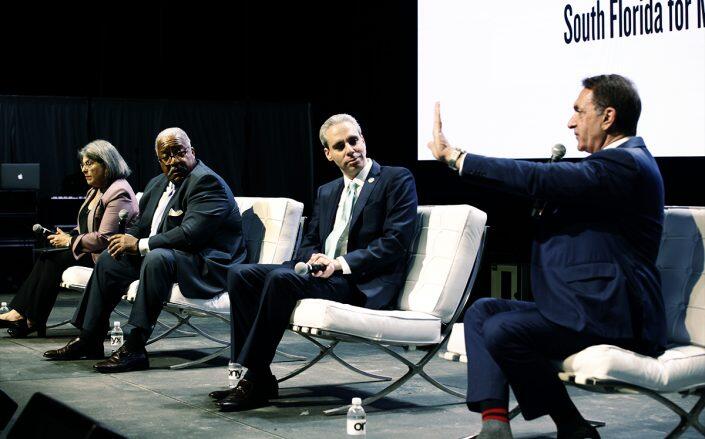South Florida mayors addressed the tech wave and real estate boom, working with testy developers and investing in infrastructure to support growth the region is experiencing at The Real Deal South Florida’s Miami event on Wednesday.
“My commitment is to be very intentional in ensuring the benefit of [such growth] is inclusive,” said West Palm Beach Mayor Keith James, referring to communities that have been left out in the past. The luxury end of the market has benefitted hugely from a migration of out-of-state buyers.
Fort Lauderdale Mayor Dean Trantalis addressed gentrification and repeated the saying that “a rising tide floats all boats.”
“Gentrification means development,” Trantalis said. “We have a political as well as a cultural conflict here to try to work with our neighbors.”

The mayors, who also included Miami-Dade Mayor Daniella Levine-Cava, Miami Mayor Francis Suarez and Boca Raton Mayor Scott Singer, all spoke about the migration of companies and people to South Florida since the pandemic began nearly two years ago during the event’s first panel, “How Can Government Best Position South Florida for More Growth?” The seventh annual TRD Real Estate Showcase and Forum is taking place at Mana Wynwood in Miami.
“I was just in New York talking to a number of companies. There was no hesitation. The pipeline is not closing,” James said. “So we have to take advantage of these opportunities while they’re there.”
But infrastructure is a priority for all mayors, as well as making sure another Surfside collapse does not happen again.
“We’re tapped out. Our roads can no longer accommodate” the traffic, Trantalis said.
Singer of Boca Raton said the city is building tunnels and banking on Brightline’s expansion to help sustain the population growth.
Levine-Cava, the only county mayor on the panel, said the over $1 trillion infrastructure bill will be a “real boon for us.” She referred to the huge demand for affordable housing, and said “the environment is our economy.”
“It’s our job to make sure the infrastructure exists. And similarly that you build where there is infrastructure,” she said. “We’re often keeping people waiting because they can’t get into the water and sewer system.” Yet, Miami-Dade is not on the list of areas set to receive disbursements for sewer projects, she said, adding, “Stay tuned.”
In reference to tightening building codes, Singer said the city of Boca Raton made all reports public, including draft ones, to increase transparency.
“We thought it was important to get ahead of this to bring confidence back to the market,” he added.
Stuart Elliott, TRD Editor-in-Chief and moderator of the panel, asked some mayors about dealing with developers who have flip-flopped on their plans or sued their cities.
It’s “rough and tumble politics,” James said, referring to Charles Cohen’s attorney alluding to suing the city. “His lawyer knows as well as his client that his job is to get three votes of the commissioners. You can’t blame the decision makers for making the decision.
When Elliott asked about developers who flip-flopped, James clarified that it was one developer: billionaire Jeff Greene, who sought zoning changes for a major project in downtown West Palm Beach.
“You’ve seen a lot of flip-flopping from one developer. I basically said ‘No, a deal’s a deal,’” James said, later adding that, “Three months ago I got a call from Jeff, and in his own way he apologized and said I was right. In his own way.”
Suarez, who has promoted the city of Miami heavily to appeal to major tech and finance firms, said that over the last 16 months, companies with a collective $1.2 trillion in assets under management have moved to the Miami area, with more than 2,000 jobs created.
“The market is incredibly hot, and Miami is the place to be,” Suarez said.
And when asked about political dysfunction and corruption in South Florida, Singer chimed in.
“I think politics is really well monitored in South Florida. We’re crushing it and we’re going to continue crushing it,” he said.
Before Suarez headed out early to be sworn in for his second term, Elliott jokingly asked him if cryptocurrency, which Suarez has promoted in the city, will overtake the dollar.
The answer was yes.
